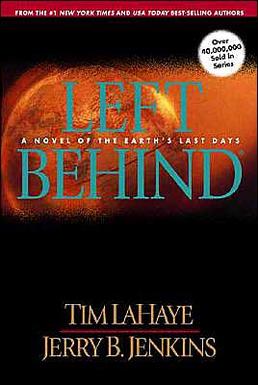(Originally posted December 9, 2003.)
Left Behind, pp. 23-24
Here are some of the things that Buck Williams, the greatest investigative reporter of all time, is thinking when he first realizes that dozens of people on his airplane have suddenly disappeared midflight:
… His mind searched its memory banks for anything he had ever read, seen, or heard of any technology that could remove people from their clothes and make them disappear from a decidedly secure environment. Whoever did this, were they on the plane? Would they make demands? Would another wave of disappearances be next? Would he become a victim? Where would he find himself?
As far as a “technology that could remove people from their clothes,” Billy Dee and I would recommend Colt 45 — works every time.
 Buck asks a few good questions here, but he — and LaHaye and Jenkins — seems to forget about them as soon as they’re asked.
Buck asks a few good questions here, but he — and LaHaye and Jenkins — seems to forget about them as soon as they’re asked.
Buck wonders here if he might “become a victim” of a following wave of disappearances. This marks one of the few places in the book where someone reacts to the mass-disappearances with an appropriate horror — and the corresponding relief that they have been spared. Most of the characters in the book react as though they had read the book jacket — seeming to believe they should be envious of those who are missing.
Buck also wonders about the perpetrators of this mass dissappearance — something he and everyone else in the book neglect to do later on in the story. An incuriousity that, again, makes it seem like every character in this book knew ahead of time that they’re in a “rapture” story. “Whoever did this,” he wonders, “were they on the plane?”
That’s a very good question. As far as Buck and the others know at this point, the disappearances are limited to this airplane. This constitutes a great mystery, yes, but surely it also represents a serious breach of security. Yet no one seems to respond in this way. Buck simply returns to his seat to muse quietly to himself.
Here the reader may start to wonder if Buck Williams, alleged GIRAT, is even slightly competent as a journalist. He displays no basic reporting instincts. The man in the seat in front of his has disappeared, but he doesn’t examine the missing man’s clothes and personal effects. He doesn’t try to find out more about the man — a real reporter would have a few pages of notes by now with Harold’s full name, age, hometown, occupation, info on any health problems. A reporter would collect all that almost without thinking. A real reporter would also want to know the precise number of people missing. Buck and Harold’s wife were asleep when the disappearances occurred, but someone on the plane may have been awake. Interview everyone, take notes, find out if anybody saw anything.
Buck does none of that. Rayford Steele, the pilot, behaves more like a reporter than Buck does. Steele at least tries to get a more precise idea of the scope of the disappearances. He tells the passengers, “My first officer, Mr. Smith, will now make a cursory count of empty seats.”
Steele may not know what the word “cursory” means, but at least he has the sense to collect a bit more information on what has happened. He also hits on the scheme of using “foreign entry cards” to gather data on the missing:
“I’m going to ask the flight attendants to check the lavatories and be sure everybody is accounted for. Then I’ll ask them to pass out foreign entry cards. If anyone in your party is missing, I would like you to fill out the card in his or her name and list every shred of detail you can think of, from date of birth to description. I’m sure you all realize that we have a very troubling situation. The cards will give us a count of those missing, and I’ll have something to give authorities. …”
This scheme will provide Steele with an accurate count of the missing — minus those missing who were not traveling as part of a “party,” and minus those parties that are missing in their entirety. But still, Rayford is taking charge, reassuring his passengers that he is in control of the situation by assigning them more paperwork.
It’s all a crock, though. Rayford never tallies even the partial count the cards would provide. He never reads them himself and he never gives them to any “authorities.” Neither he nor the authors ever mention these cards again.
One more of Buck’s initial questions represents a real missed opportunity in the novel. “Whoever did this,” Buck wonders, “Would they make demands?”
Excellent question. Think about it. This is the perfect chance for an opportunistic would-be supervillain — Lex Luthor, Pinky and the Brain, Dick Cheney — to collect a global ransom.
Just have your henchmen hack into global communications satellites and beam the following message around the world: “Your missing loved ones are safe. If you want to see them again, you must meet the following demands: [massive wealth, the world’s entire nuclear arsenal, you destroy whatever conventional weapons you don’t hand over to me, yada yada]. If these demands are not met within seven days, then more of you will be taken.”
It’s a colossal bluff, but the people are scared, they’re in shock — they’ll buy it. Their children are missing. All children are missing. You can ask for anything, extorting your way to absolute global dominion. [Insert maniacal laughter here.]
That would have been so much slicker — and so much more evil — than the flimsy Jedi-wannabe mind-tricks that L&J’s Antichrist figure uses to rise to power later in the book.













